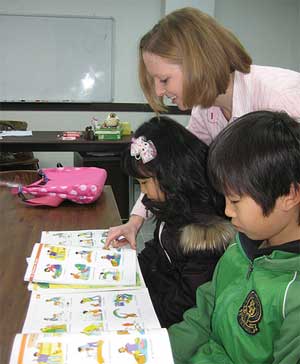Thinking about teaching abroad in South Korea? It’s certainly a great idea that thousands partake in each year. Before you start making lists of what to bring and long before you buy a Korean dictionary, here’s a few tips so, bluntly, you won’t screw yourself over as you prepare to go.
Give yourself time


Word is that the entire Visa process takes about a month to complete. This includes sending all your documents to your future school or placement company, Korean Immigration receiving and processing your documents so you can receive a Visa issuance number and finally, the Korean Consulate in the United States obtaining documents you send and issuing you a Visa, so you can hop on a plane to Seoul and call it a day. Or a year in South Korea.
Though it may look a bit daunting, the process is actually pretty simple. But, just in case, you want to give yourself more than a month before your potential departure date because of odd, unexpected incidents that could occur (see below). This is especially true for Korea because as of 2007, the Korean government tightened the non-immigrant status of foreign English teachers. Meaning, new regulations such as submitting a certificate of criminal history and a medical examination report, as well as having an interview with Korean consul at the Korean consulate in their country.
It’s also beneficial to start early because though teaching English is a big business, other countries’ economies are hurting, too, and you want to make sure you have a job lined up.
Some of the most popular teaching countries in Asia
China, Japan, South Korea, Taiwan and Thailand are some of the common teaching destinations in Asia. If you simply Google the country and “teaching English,” you should receive more than enough options. With all countries, you can get the big city experience or live in a smaller area. Think about what type of culture you want to live in.
Make sure you have good reasons for going to the country of your choice
Did you think China looked beautiful when it was showcased on the world’s stage last August during the Beijing Summer Olympics? Do you really love your special Pad Thai and all other food that comes from Thailand? Did you write your favorite college paper on the Korean war? Well, you can look at photos of China, most likely chow down on Thai in your current U.S. locale and, of course, you can always re-read your glorious paper.


It’s great if you answered yes to any or all of these questions, but just because you think a country sounds cool doesn’t mean you should hop on the next plane and head over.
It’s imperative to research cities or towns you’d consider. Considering the close to 700,000-person population in Lianyungang north of Shanghai, could fit into its larger neighbor about 22 times (nearly 16 million people bustle about each day), you’ll want to at least have an idea of your town preferences.
Besides that, ask yourself the following questions…
1. What are the living conditions like in the town?
2. What’s the history of the place? Is there any current tension?
3. Do I know anyone teaching abroad? What do they think of their experience?
4. What type of climate do I like to live in? Do I need snow or do I pout when I don’t live within an hour’s distance of water?
5. Is the country landlocked? What are easy traveling opportunities?
Many people teach abroad for the experience of new cultures, people and the chance to save a decent amount of money, particularly in some Asian countries.
Don’t just pick a school or program because it’s the first one offered to you


In some countries, such as South Korea, most English teachers go through placement companies that set them up in schools. Then, there are programs like the JET (Japanese Exchange and Teaching program) in Japan, where students go through a more structured program that includes pre-departure orientations.
Regardless, make sure you do your research before you commit to one program or school. In Korea, the obvious choice is between public schools and hagwons (private schools).
Public schools certainly have advantages: You usually co-teach with a Korean native, you get longer vacation periods and, if you like big classes, you can most likely say “Annyong Haseyo” (“hello”) to at least 30 eager students. In private schools, you’ll likely only have classes of eight to 12 students. You have less time to holiday, but hey, if you want to save more money, that’s not such a bad thing.
Find out what the dress code is like, how structured the program is and, most definitely ask to be put in touch with current teachers at the school. They’ll provide the best insight for your potential future.
Read, read, read the contract carefully. That is, before you sign
It’s awesome if you’ve already found an awesome placement company and had an interview with your potential school. Now, before you sign the contract, make sure you read it carefully so you understand everything in there.
Know exactly what your job description entails. Will you plan your own curriculum? What about providing your own teaching supplies such as flashcards? Do you get any training before school begins?
Specifically, read the hours per month you’ll work and if you get overtime payment if you go over your hours. It’s typically 120 hours per month, not including planning time.
Also, understand the contract agreement if you should decide to leave early. Usually, if it’s after six months, your school will pay for your ticket back home.
Don’t hesitate if you have questions! The deal of free plane tickets, free accommodation and a year teaching in a foreign country might sound too good to be true. Make sure the contract is fair.
Don’t think you’re a criminal? Make sure your criminal background check agrees
Remember that one time when you were 17 years old, accidentally got too drunk, blacked out and woke up with an underage drinking ticket in your hand? You and your parents may not want to remember the event that well, but make sure your criminal background check doesn’t even know it happened.
As you consider countries where you might want to teach, talk to your program or placement company regarding the strictness of the country’s immigration policies if there’s even a sliver of doubt you might have something on your record. Some countries are more lenient than others, but it’s safer to check.
Before you accept a contract – particularly in South Korea – make sure your criminal background check is clean. It’s as simple as getting in touch with your state bureau of investigation, and asking them to look up your record.
It’s important to do this early for if there is need to expunge something from your record, it can take months.
When you order transcripts, make sure your university uses an official seal
The most basic requirement for teaching abroad in most countries is a bachelor’s degree, and you’ll need copies of your transcripts for both your future country’s immigration officers and again for the consulate in the United States.
It’s imperative that your transcript has an official university seal when sent to the country’s immigration office. A seal is a sticker or a stamp on the back of the envelope.
If you order your transcript in person, simply tell the person behind the desk that you’re teaching abroad and that it needs to be officially sealed. If you order online, check the online form to see if there’s a place to check for a seal. If there’s not an obvious choice, call your university’s office and they should be able to aid you.
An idea of some of the forms you should have on-hand
–Original diploma
–At least two copies of your diploma
–Passport photos
–Sealed transcript
–Criminal background check